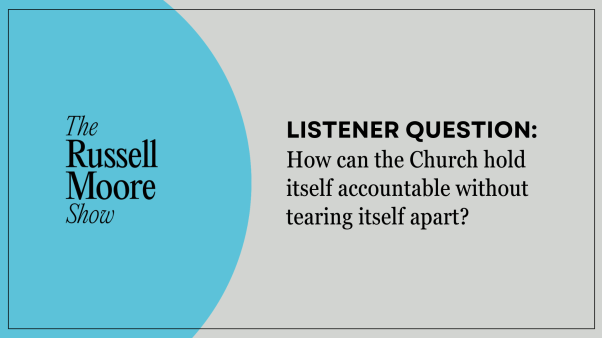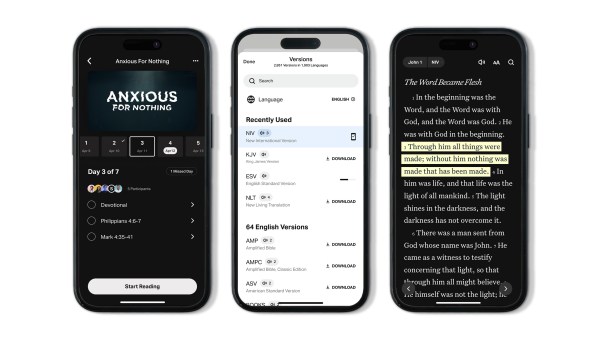Jeff Manion is a risk taker. He became pastor of Ada Bible Church near Grand Rapids, Michigan, when it had 25 people, and during his first seven years, he had to overcome three stalled building programs so the congregation could move into its first decent building. Now, he’s been with the church for 30 years, and it has grown significantly both in numbers and in the risks it’s been willing to take. On the topic of money, he’s pushed himself from an apologetic and timid preacher to someone who looks forward to covering such themes as earning, saving, borrowing, and giving generously.
It may surprise you, then, to learn that Manion’s new book is about contentment. How can a man whose ministry has been characterized by vision and progress champion contentment? Marshall Shelley and Paul Pastor sat down with Manion to discuss the difference between institutional and personal satisfaction, what it takes to build a church culture of generosity, and why “contentment” isn’t the same thing as “lack of ambition.”
Your latest book explores contentment. What does contentment look like in ministry, specifically with money?
It means that people live simply, live on less than they can afford to live on. This provides financial margin to give money away. It means that all of us in our church spend less than we make so our resources are available to the kingdom of God. It means people are content with less so they can give more.
By contentment in ministry, I don’t mean lack of vision, lack of discipline, or lack of initiative. I don’t mean I’m content with a bad situation remaining bad. I don’t mean laziness or complacency. The apostle Paul said, “I have learned to be content whatever the circumstances.” Yet I would not call Paul unmotivated. He had a well-tuned sense of vision. He lived a missional life.
Biblical contentment means taking appropriate risk and trusting God for the outcome. How can you dream big without leading your people into suffocating debt? “We want to step out in faith—reasonably.” That statement sounds like a contradiction, but it doesn’t have to be. You don’t want goals so low that people aren’t stretched, but you don’t want to aim so high that you end up in financial problems. Ask yourself, Where is the risk so pathetic that I’m not challenging people? Where is the risk too much, placing debilitating financial strain on my organization?
What’s an appropriate risk your church has taken?
In 2000, we purchased 60 acres in the country to build a new facility to house our 1,000-person congregation. It was our first multimillion dollar project. Less than half of the money had been given, and we had to decide whether or not to pull the trigger on the project. I found myself in the longest board meeting of my life. Do we build only half the building? Do we postpone it? Are we leading our congregation into financial ruin?
The meeting lasted five hours, and we went around and around. Some wanted to know, “Why are we starting construction when we don’t have all of the money?” Others wondered, “Why are we building something so small? Shouldn’t it be twice this size?”
Eventually Henry, one of our elders, said, “If those of us in this room, the board members, are willing to liquidate our savings, sell our homes, and pull our money out of retirement, we can make that payment indefinitely. Is there any way we will not allow that payment to be made?” He wanted to know if we were “all-in.” Henry had been with the church since we had 25 people. He had given his life to this ministry for decades. So for him this wasn’t a financial question. It was a question of whether his money was going to be an extension of the life he was already living.
After considering our personal stakes in the ministry, we finally voted to move forward. By God’s grace and blessing, we paid off that building three years after we moved into it. Appropriate financial risk shouldn’t swamp us, but it should push us to exercise faith.
What are the enemies of this kind of risky contentment?
Two things can kill a church: refusal to change, and chronic instability. When it comes to funding, there’s a lot to be said for steady, aggressive movement. God has always asked his people to move and stretch. In the early church, people were liquidating their property to support widows. The church was scattered through persecution, but they took the gospel wherever they went. Our story in the Bible is not static. It’s a story of movement, of acting boldly in faith.
But lack of consistency can be equally damaging. I’ve seen this often: a pastor doesn’t have a strong vision for his church, so he borrows one. When he loses interest, he borrows another one. It doesn’t accomplish what he wanted, so he borrows a third one.
The chief inhibitor to generosity isn’t greed; it’s fear. Fear of not having enough. And the only remedy for fear is trust. Trust and generosity walk hand in hand.
You also see this in the rapid rotation of senior pastors. A pastor has pursued a single strategy for his whole tenure: “Our goal is to start a Christian school.” But when he leaves, his replacement implements a new strategy: “Our goal is to open a community center.” He pursues that strategy for four years, then leaves, and his replacement offers a new vision: “Our goal is to put a skate park in the parking lot.” This happens over and over. “Our goal is for half of our money to go to missions.” “Our goal is to start a seeker friendly service.” People get vision whiplash. They get weary of random projects. It can turn off funding because people no longer know what they’re giving to. But enduring ministries build assurance. You can’t develop that kind of confidence in just a couple of months or years.
Is financial contentment for an individual different than financial contentment for a congregation?
I think it is. With the church’s finances, I’m asking the question, How much can we do? With my family’s finances, I’m trying to curtail spending. As an outreach driven church, we’ve gone through four major building programs. But during those same 20 years, my family has lived in a single house.
Our church is trying to draw more people to serve the kingdom. My family is shrinking. My kids turned 18 and left, mostly. What if, instead, I wanted to continually add family members to my household: from six children to 18 to 32? My house would need to accommodate that growth. I’m trying to keep my life simple and contented on a personal level, so I will have more money to give away in outreach. I would encourage a family to live in a modest home, but I’m not sure I would encourage a church to stay in the same building if they’re growing and reaching ever-more people.
How should leaders model personal contentment in front of their congregations?
I encourage pastors to do everything they can to live with financial integrity on a personal level. Be a person of grace, have a generous heart toward other people, and pursue financial generosity. We can tell people what Paul told his followers: “Follow me as I follow Christ.” Build a life and a ministry of consistency. Keep pushing ahead. And leave the results to God. Sometimes extraordinary things will happen financially, and sometimes they won’t. Sometimes you have to look back over the years to see seasons of ministry growth: leaders that you built over time and families you’ve invested in.
Thankfully, I am able to tell my congregation openly and honestly that each year my family spends less than we make. We live more simply than we have to. We have not had a credit card balance for over 10 years. We have paid off our home. We pledged as 21-year-old newlyweds making next to nothing to live on 90 percent of our income so that at least 10 percent could be given away. And God has enabled us to give more than 10 percent on many occasions. We attempt to model for the congregation a modest lifestyle, a simplicity of life that creates margin for generosity. Then I encourage them and invite them into the same journey of trust.
Pastors who do not give faithfully and generously are at a huge disadvantage when they ask their congregation to give. When they have funding issues, they have to stand up and plead with others to give. It is such a valuable asset to be able to honestly and humbly confess that this is the pattern of life we’ve set. I can honestly say, “We wouldn’t live any other way, and we want to invite you into this kind of life.”
What are the temptations pastors face in teaching people about generosity?
One temptation is to take shortcuts: starting the financial conversation by merely asking for money. “Here’s the offering basket. These are our needs. This is our budget. We’re not meeting our bills. We need you to give.” I was meeting with a young pastor who said, “Our church has its first building fund drive coming up in March. Do you have any advice on our first capital campaign?” And I said, “Yeah, you’re starting two years too late.” If you’re trying to develop a person’s posture toward financial faithfulness, you can’t start when you’re building a building. This is work that you do over a period of months and years. You’re not raising funds; you’re raising givers.
When other pastors tell me, “We’re having trouble getting people to serve and give,” I ask, “Do your people understand God’s grace, his innate generosity? Do they know that Jesus loves them?” When a person begins to tap into generosity, they’re dialing into a core of God’s character. Trying to squeeze dollars out of individuals who do not comprehend grace is futile.
What do you think holds most people back from giving?
The chief inhibitor to generosity isn’t greed; it’s fear. The college student asks, “If I support a Compassion International child for $30 a month, will I have enough for me?” People setting money aside for retirement ask, “If I give generously now, how will I have enough to live on when I’m 80 years old?”
But more than not having enough, many people fear not being enough. When my wife, Chris, and I had been giving to our ministry for several years, our friends were accumulating things much faster than we were. We were tempted to believe that we weren’t enough because we couldn’t purchase enough stuff.
This happens at an institutional level, too. Ada Bible Church has not always been a growing church. For years we were trying to build the financial momentum to get out of a tiny house structure and into our first decent building. Meanwhile people were flocking to other churches in the area.
Contentment in that situation was, again, not complacency and not an undisciplined spirit. It was the ability to say, “I’m not responsible for leading their churches. I’m responsible for leading this one. I’m not responsible for stewarding their gifts. I’m responsible for stewarding mine.”
But more than that, we benefited from the example of pastors in large churches nearby who gave generously to us and to others in ministry. When Ada Bible Church was between 100 and 200 people, I sought advice and direction from pastors of other churches in Grand Rapids. Even though what we were doing looked pretty insignificant in comparison to what they were doing, I could call Ed Dobson of Calvary Church or Wayne Schmidt of Kentwood Community Church, and they took the time to give me guidance. They were examples to me. Now that our church has grown, I want to do the same and assist others.
How do you combat the fear of not having, not being enough?
The only remedy for fear is trust. Jesus taught his disciples to pray, “Give us this day our daily bread.” God, I trust that you will take care of me while I take care of your interests. Trust and generosity walk hand in hand, and it is really difficult to pursue the generous life while scared. God delivers us from fear as we trust our Father to unleash generosity.
The journey of Scripture is a journey of trust. Abraham was asked to leave his family, leave his country, leave his people and go to a land he had never seen before. God told him, “I will bless you. I will make your name great. You will be a blessing.” But as soon as he got there, he was hit with a famine.
David was anointed king, and Saul proceeded to chase him around the desert for 10 years trying to kill him. But out of David’s struggle and trauma, we get the psalm where he says, “The Lord is my shepherd. I shall have everything that I need,” and, “Even though I walk through the valley of the shadow of death, I refuse to live in fear because God is with me.”
Whether it’s Abraham moving, or Moses leading the Israelites across the desert, or Nehemiah rebuilding the walls, the story of God’s people is one of difficulty and of trust.
Apply that to today’s economic climate.
A good-hearted Christian will rarely say no to giving. “I’m not going to do it.” A more lethal word is later. “I can’t give now, but I’ll give later.”
The journey of trust is especially important in the uncertainty of our current financial times. When my dad was going into the ministry, my grandfather told him, “Go to work for GM. You’ll be assured work for the rest of your life.” Today, I cannot imagine a parent telling their child to enter any sphere of manufacturing to assure lifetime employment. Tenure is evaporating, even in some sectors of academia. Government jobs, postal work, and other fields used to guarantee a pension, but that security is fading away. We used to believe that retirement portfolios would grow year after year, but suddenly they’re taking 40 percent hits. I remember being told that cars depreciate, but houses will always go up in value. Until 2009.
A key word these days is uncertainty. People do not have confidence that their houses and retirement accounts will hold value, that the companies they work for won’t merge, sell, or send work elsewhere. But it is a wonderful season to talk about trust. There was an overdependence on what money could do for us, and we’re being reminded of the vulnerability that has been here all the time. People are fearful and uncertain, but it’s a wonderful opportunity to reevaluate our certainty in who our God is.
What if someone is deeply in debt? Would you still ask them to tithe?
I’ve never told people they should tithe a full 10 percent while deeply in debt. I also have never told people they must get out of debt before beginning to give. I hope an individual would give something as they’re moving toward debt freedom. Part of the enjoyment of becoming debt free is the capacity to give on a different level. Getting out from under crushing debt gives you the freedom to be more generous in assisting your church and other ministries.
I would also emphasize the concept of relational generosity. It is possible for a Christian to be a tither in the legalistic sense financially, but not be gracious. Jesus said of the Pharisees in Matthew, “You tithe your spices—your mint, your dill, your cumin.” Not only were they tithing their coins, they were weighing out a tenth of their spices. But Jesus said, “Yet you are neglecting the weightier matters of the law—justice, mercy, and faithfulness.” So a person can be a financial tither but not be gracious in spirit.
A generous spirit is cultivated by acting magnanimously; allowing small, insignificant insults to evaporate rapidly; forgiving faster; being gracious with individuals, whether it’s the person in the checkout line or someone taking too much of our time. That generous spirit is called relational generosity—financial generosity is a subset of that. A person who is staggering financially can grow in multiple areas of generosity, knowing that the financial area will flow out of the others.
How do you develop generosity in a stubborn giver?
As God begins to stir a person towards generosity, a good-hearted Christian will rarely say no to giving. Rarely will they lock their arms and say, “I’m not going to do it. I’m not generous now and I never will be.” A more lethal word is later.
A couple graduating from college and marrying in their mid-20s may want to be generous some day, but not now. They still have oppressive student loans. They’re just getting started in their careers, just getting started building a family. They’re trying to make a down payment on a car or a house. They deeply desire to be generous people, but just not now. Later.
And then kids arrive, and kids are expensive. They go from two incomes to an income and a half. Then as the kids grow older, they want to help with college expenses. They turn 40 and want to start putting money into retirement. All of a sudden they’re 50, and for 30 years they’ve said “later,” but later really meant no.
Do you really think you’re going to be able to reverse a rut that you’ve been in for 30 years? The word later is lethal. It can cripple generosity.
So I challenge people to start somewhere, start now—one percent, two, three. Support a Compassion International child. Do something and do it immediately. But whatever you do, don’t postpone.
Giving money away is one of the most powerful countercultural, counter-materialism things a person can do. And I hate to see people postpone it into oblivion.
Copyright © 2013 by the author or Christianity Today/Leadership Journal. Click here for reprint information on Leadership Journal.










